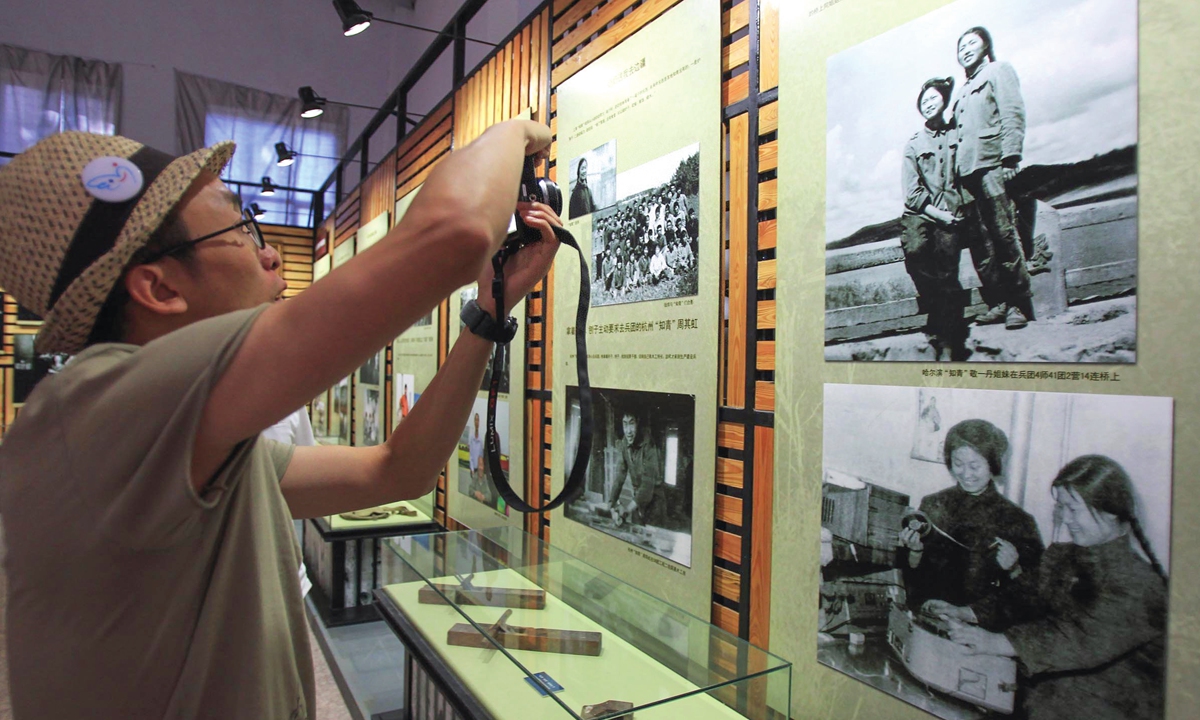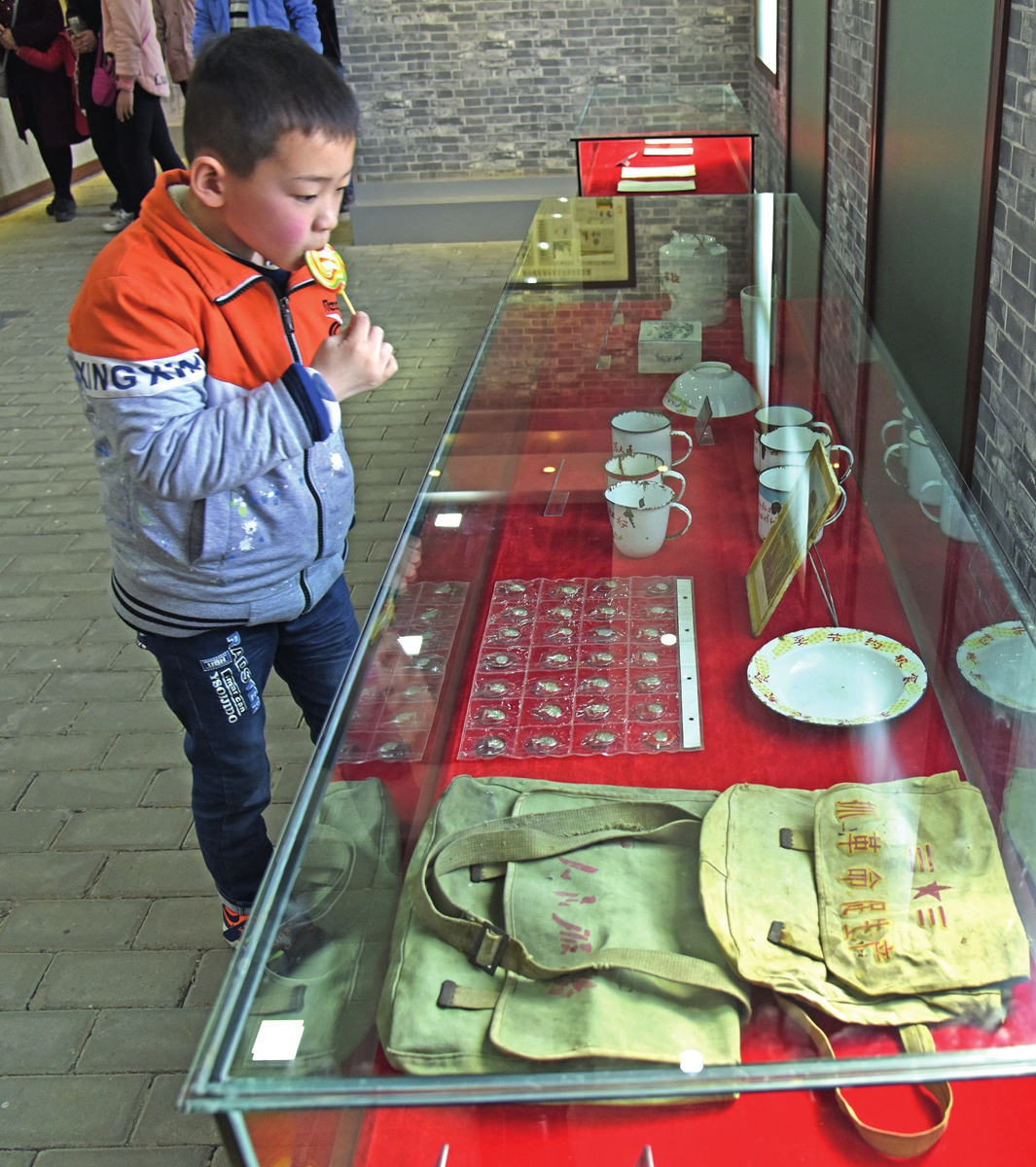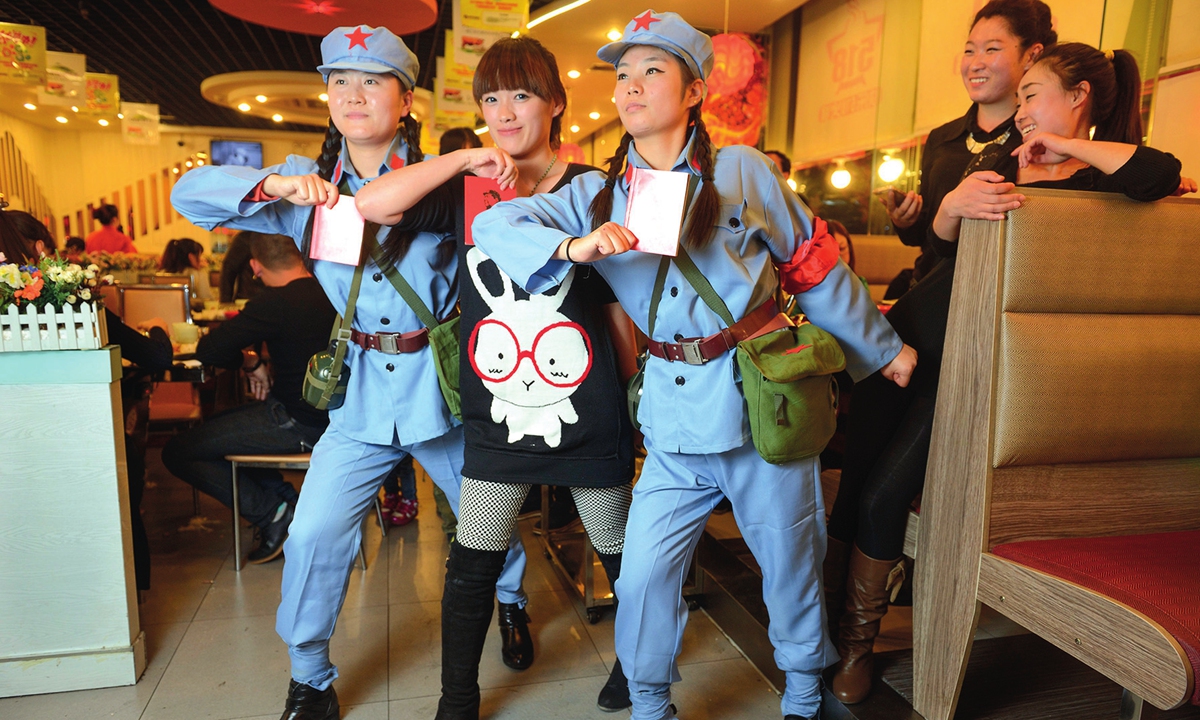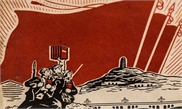
A visitor tours the Educated Youth Museum in Heihe, Northeast China’s Heilongjiang Province. Photo: Xinhua
A boy looks at objects from the Cultural Revolution exhibited at a former site of commune in Zhumadian, Central China’s Henan Province. Photo: VCG A customer poses with actors dressed as red guards invited by a restaurant for attracting customers in Hohhot, North China's Inner Mongolia Autonomous Region. Photo: cnsphoto
After more than four decades, the Cultural Revolution (1966-76) is not forgotten in China. Older generations pass on the stories of their own experience from the period, whether sad or painful, and young students learn about its mistakes in school, as the pain and lessons the country gained have become a power that contributes to what the nation has achieved today.
The Cultural Revolution is never "avoided" or considered "too sensitive to talk about," experts said, after some Western media outlets and netizens hyped up a Chinese history book's illustration of the event, trying to dig up and "speculate" on any possible trend in China's politics through any tiny detail.
Some overseas media recently have reported a 2019 version of Chinese high school textbook, which described the Cultural Revolution as "domestic turmoil." The articles compared this with the history text book for junior middle school students two years ago, which aroused discussion. Some Western media claimed the junior textbook failed to unmistakably criticize the Cultural Revolution as a "mistake" but rather describes it as part of a "difficult exploration."
The Western media outlets therefore charged that China was trying to "whitewash" this piece of history and even claimed China was trying to reverse the verdict of the Cultural Revolution.
However, education experts say that China's definition of the Cultural Revolution has never changed throughout the past decades.
"Some Western media just want to find faults which don't exist," Su Wei, a professor at the Party School of the CPC Chongqing Municipal Committee, told the Global Times.

Standardized textbook
The current high school history textbook is the national unified edition published by the People's Education Press under the Ministry of Education in September 2019.
In 2016, it was put forward that textbooks for Chinese, politics and history should be nationally standardized. In 2017, history experts in universities and institutes started the task of compiling a comprehensive book according to the curriculum standards given by the Ministry of Education.
The textbook was made after repeated discussions and reviews. Before being officially adopted, the draft was sent to 140 senior history teachers across the country, and the compiling group received many suggestions.
In the new school year of 2019, the new textbook was first used in six provincial regions, including Beijing and Shanghai. The textbook will be adopted by all regions in the Chinese mainland by 2022.
"The current depiction is consistent with Chinese people's memories of the Cultural Revolution," Chu Zhaohui, a research fellow at China's National Institute of Education Sciences, told the Global Times. "With the standardized textbook, the country is to give young people a common understanding of history," Chu noted.
Previously, there were several different versions of history textbooks. "Some talked more about the Cultural Revolution and some less, but all of them were based on the unified syllabus," said a senior expert from the compilation group of the current high school history textbook published by the People's Education Press, remarking that some netizens and overseas media were too sensitive as they hyped up the little differences and changes.
"When it comes to the content about the Cultural Revolution in high school textbooks, we authors compiled the textbook based on the decision on historical questions at the Third Plenary Session of the 11th Central Committee of the Communist Party of China," the expert told the Global Times.
"The Cultural Revolution did not in fact constitute a revolution or social progress in any sense, nor could it possibly have done so. It was initiated by a leader laboring under misapprehension and capitalized on by counter-revolutionary cliques, leading to domestic turmoil that brought catastrophe to the Party, the country and the whole people," it read.
He noted there is no "avoidance" or "sensitivity" about the topic. The content about the Cultural Revolution is based on the syllabus of the educational department. There hasn't been any decision to change the curriculum regarding the Cultural Revolution in the past few years, the senior expert said. There is no substantive difference in Cultural Revolution chapters in the history textbooks, experts say.
According to the expert compiling the textbook, high school textbooks are not that detailed in general due to the limited class hours. "High school students only need to study the conclusion of the Cultural Revolution. In universities, students who study this period of history will have a thorough and deep learning about it."
China does not avoid talking about the Cultural Revolution, and the society will better review the event as time passes, Su told the Global Times. Late Chinese leader Deng Xiaoping said after the Cultural Revolution in December 1978 that Chinese people should "unite as one in looking to the future."
"The CPC recognized its mistake, fixed it and achieved success in another way, which comes with China's reform and opening-up," Su said. "After generations of people being calm, we will be able to review the Cultural Revolution more objectively."

Public memories
Ma Qinglong (pseudonym), born in the 1990s, still remembers a story about Cultural Revolution: a grassroots official was "publicly persecuted" because he hung a notebook under a Chairman Mao poster, for which some accused him of "tagging a label to the great leader."
Ma's father told him the story when he was a child. "I felt it was funny, but then I felt sorry for the man," he told the Global Times. At school, his Chinese teacher told the student how writer Lao She drowned himself in the lake amid persecution.
"I understand enough it was a ridiculous, but more painful period in Chinese history," he said.
"The Cultural Revolution is the public memory of China. Reflections about it are not neglected in Chinese society today."
In 2017, the film Youth attracted millions of Chinese filmgoers to "look for their memories." The film depicts the fate of a group of dancers during and after the Cultural Revolution.
The film reflects on that period and retells the scenes from the memories of the generations who experienced it. Its box office reached 1.5 billion yuan ($22 million) and, along with Farewell My Concubine and In the Heat of the Sun, it became one of the classic Chinese movies illustrating the history of Cultural Revolution.
But Chinese people now have diverse memories about the Cultural Revolution. Some are critical of it and oppose everything related to it, while some cherish the period and would like China to return to the period. "These people are both extremes who could tear up the society," Su said.
"In theoretical research, there is still a 'sensitive zone,' as some files on Cultural Revolution are not totally open yet," Su said. "But the society and the public do not avoid it."
Passing on understanding
"We don't have to wear a magnifying glass to read a middle school history textbook word for word," Zhang Hong (pseudonym), a history teacher from Fuzhou, Fujian Province, told the Global Times.
In her eight-year career of teaching history in high school, she would not avoid or skip this part like some Western media speculated, but she would prepare carefully, treating it like any other chapter in the textbook.
Zhang noted the chapter of the Cultural Revolution in the textbook is attached to the unit theme of "the hard exploration and construction achievements of socialism," which usually takes half of a lesson.
In class, Zhang chose to put some photos of people who were "breaking the four Olds" and of the student movement during the Cultural Revolution on a slideshow, so that students could have a more intuitive understanding of the political turmoil of that time.
There are many students who are curious about Cultural Revolution. "When we discuss this topic objectively and the veil of mystery is removed, they can understand and accept it calmly."
According to Zhang, although current historical texts have changed some of the context of the Cultural Revolution, the curriculum standards for teachers have not changed: to understand the mistakes of the Cultural Revolution and pass on an objective attitude to it.
Li Qiao contributed to the story


